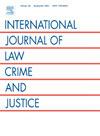The aftermath of campus sexual harassment: Psychological and academic effects
IF 1.4
4区 社会学
Q3 CRIMINOLOGY & PENOLOGY
International Journal of Law Crime and Justice
Pub Date : 2025-05-16
DOI:10.1016/j.ijlcj.2025.100748
引用次数: 0
Abstract
In recent years, sexual harassment (SH) in universities has become a significant concern in Ecuador. This research aims to examine the psychological and academic effects of SH on university students, focusing on three specific outcome variables: absenteeism, presenteeism, and anxious-depressive symptoms. Additionally, the study explores whether the relationships of interest are influenced by students' gender identity and sexual orientation. The quantitative empirical analysis was conducted using a probabilistic sample of 21,876 students from 14 public and private universities in Ecuador. University SH was assessed using the Sexual Harassment Scale in Higher Education Institutions (ASIES), and data analysis was performed using Poisson regressions. The findings indicate a positive relationship between SH and the outcomes considered. When analyzing the various dimensions of harassment, it is observed that verbal and non-verbal harassment are the modalities that generate the most relevant effects. On the other hand, the psychoeducational repercussions of harassment are moderated by gender identity and sexual orientation, with women and heterosexual students experiencing more pronounced effects. In this context, the findings suggest that SH tends to have a less significant impact on the academic engagement and mental health of sexual minorities.
校园性骚扰的后果:心理和学术影响
近年来,大学性骚扰已成为厄瓜多尔的一个重大问题。本研究的目的是考察心理和学业对大学生的影响,重点关注三个特定的结果变量:旷工、出勤和焦虑抑郁症状。此外,本研究还探讨了兴趣关系是否受到学生性别认同和性取向的影响。定量实证分析采用厄瓜多尔14所公立和私立大学的21876名学生的概率样本进行。采用高校性骚扰量表(ASIES)对高校性骚扰行为进行评估,并采用泊松回归对数据进行分析。研究结果表明,SH与考虑的结果之间存在正相关关系。在分析骚扰的各个维度时,可以观察到言语和非言语骚扰是产生最相关影响的方式。另一方面,性骚扰的心理教育影响受到性别认同和性取向的缓和,女性和异性恋学生受到的影响更为明显。在此背景下,研究结果表明,性取向对性少数群体的学业投入和心理健康的影响不太显著。
本文章由计算机程序翻译,如有差异,请以英文原文为准。
求助全文
约1分钟内获得全文
求助全文
来源期刊
CiteScore
2.70
自引率
0.00%
发文量
25
审稿时长
47 days
期刊介绍:
The International Journal of Law, Crime and Justice is an international and fully peer reviewed journal which welcomes high quality, theoretically informed papers on a wide range of fields linked to criminological research and analysis. It invites submissions relating to: Studies of crime and interpretations of forms and dimensions of criminality; Analyses of criminological debates and contested theoretical frameworks of criminological analysis; Research and analysis of criminal justice and penal policy and practices; Research and analysis of policing policies and policing forms and practices. We particularly welcome submissions relating to more recent and emerging areas of criminological enquiry including cyber-enabled crime, fraud-related crime, terrorism and hate crime.

 求助内容:
求助内容: 应助结果提醒方式:
应助结果提醒方式:


